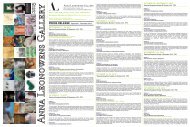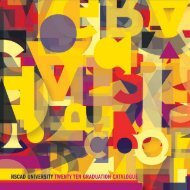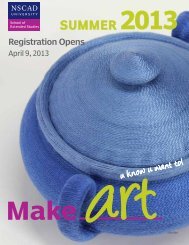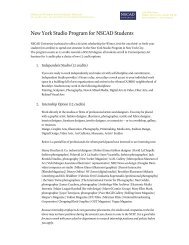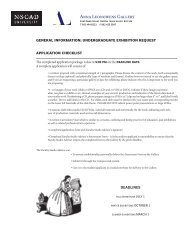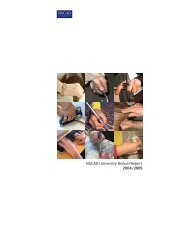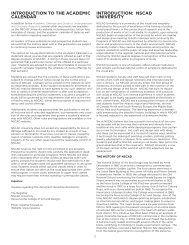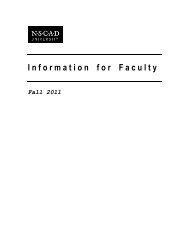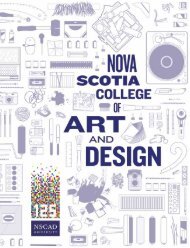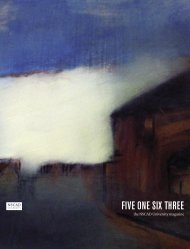Rethinking the Contemporary Art School - Nova Scotia College of ...
Rethinking the Contemporary Art School - Nova Scotia College of ...
Rethinking the Contemporary Art School - Nova Scotia College of ...
You also want an ePaper? Increase the reach of your titles
YUMPU automatically turns print PDFs into web optimized ePapers that Google loves.
Juli Carson and | Curriculum and<br />
Bruce Yonemoto Practice in <strong>the</strong><br />
Age <strong>of</strong> Post-Studio<br />
<strong>Art</strong> Production<br />
| Part One: On dialectics and reversals<br />
[There is a debate that] has not advanced beyond <strong>the</strong> monotonous<br />
reiteration <strong>of</strong> arguments for and against: on <strong>the</strong> one hand, <strong>the</strong> correct<br />
political line is demanded <strong>of</strong> <strong>the</strong> poet; on <strong>the</strong> o<strong>the</strong>r, it is justifiable to<br />
expect his work to have quality. Such a formulation between <strong>the</strong> two<br />
factors, political and quality, has not been perceived. Of course, <strong>the</strong><br />
connection can be asserted dogmatically. You can declare: a work that<br />
shows <strong>the</strong> correct political tendency need show no o<strong>the</strong>r quality. You<br />
can also declare: a work that exhibits <strong>the</strong> correct tendency must <strong>of</strong> ne-<br />
cessity have every o<strong>the</strong>r quality.<br />
Chapter Six<br />
Walter Benjamin, “Author as Producer.” 1<br />
In his 1934 address to <strong>the</strong> Institute for <strong>the</strong> Study <strong>of</strong> Fascism in Paris, Walter<br />
Benjamin argued across a polemic <strong>the</strong>n debated by <strong>the</strong> Left. Simply stated:<br />
Must artists be politically committed? Or can <strong>the</strong>y be left to experiment with<br />
<strong>the</strong>ir own formal devices? Is this even an accurate polemic? Benjamin concluded<br />
that nei<strong>the</strong>r position was true alone. He thus gave us <strong>the</strong> famous axiom,<br />
which became central to a branch <strong>of</strong> critical contemporary art practice: <strong>the</strong><br />
tendency <strong>of</strong> a literary work can only be politically correct if it is also literarily<br />
correct. Which is to say, <strong>the</strong> politically correct tendency includes a literary tendency.<br />
2 Since <strong>the</strong> political cannot be disentangled from <strong>the</strong> aes<strong>the</strong>tic because<br />
it is through aes<strong>the</strong>tics that <strong>the</strong> political presents itself, for an artist to be politically<br />
committed s/he has to maintain a high level <strong>of</strong> aes<strong>the</strong>tic competency.<br />
In Benjamin’s time, <strong>the</strong> Left’s debate was a question <strong>of</strong> political commitment<br />
versus cultural literacy. Today it has been reinvented as cultural <strong>the</strong>ory versus<br />
aes<strong>the</strong>tic disciplinarity. And in some cases, as <strong>the</strong> debate progresses, <strong>the</strong> term<br />
“interdisciplinarity” has been collapsed with “cultural <strong>the</strong>ory,” so that an even<br />
more specific question <strong>of</strong> interdisciplinarity versus disciplinarity has emerged.<br />
As in Benjamin’s times, this is a false polemic.<br />
Deep skepticism <strong>of</strong> High Modernist disciplinarity—what New Yorkers called<br />
“reductivism”—defined <strong>the</strong> 1980s “post-studio” school <strong>of</strong> art. Even so, <strong>the</strong> pioneers<br />
<strong>of</strong> this international school—Daniel Buren, Michael Asher, Hans Haacke,



